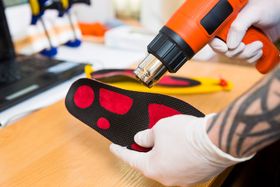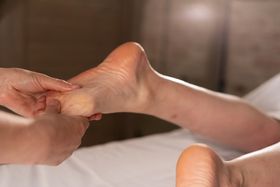What Is the Best Type of Arch Support for Flat Feet?
Different types of flat feet and their ranging severities will require different arch supports. Read this article to find out which ones might be right for you.
Updated February 17, 2023
There are 2 different kinds of flat feet (also called fallen arches and related to overpronation):
- Flexible flat feet (FFF) appear to have arches when an individual is sitting or on their tiptoes, while their arches depress when they put weight on them in a standing position.
- Rigid flat feet (RFF) have the same depressed arches regardless of foot position.
In many cases, flexible flat feet don't require treatment as they don't cause pain or discomfort. Many children have FFF and only develop arches at about 7 years of age. However, if you have RFF or symptomatic FFF, then artificial arch supports are recommended.
» Need arch support when hiking? Check out the best insoles for hiking boots
Different Arch Types for Flat Feet
High Arch Insoles
Overpronation is a condition in which the ankle rolls too far inward and depresses the arch, putting excess pressure on the big toe, ball of the foot, inside of the heel, and sometimes the plantar fascia and other tendons. It is typically rather painful, and so high arch supports are required to change the positioning of the foot to redistribute the pressure.
Medium Arch Insoles
If you don't have severe overpronation and your flat feet aren't causing severe pain and discomfort, then you might find some relief in some less prominent medium arch supports. They will still support your arch and redistribute pressure but are not as dramatic as high arch supports.
Which Arch Supports Should You Get?
This question depends largely on the severity of your condition and its symptoms. You may not need high arch insoles, as medium arch insoles can give you some extra support for mild pain and discomfort. Still, only a podiatrist will be able to give you an accurate recommendation on the correct arch supports for your specific criteria.
Related Articles

Benefits of Wearing Arch Supports for Your Feet and Ankles
Babafemi Adebajo
December 18, 2024

The Cost of Custom Orthotics: Are They Worth It?
Babafemi Adebajo
July 15, 2025

How to Relieve Plantar Fasciitis Pain Using Pressure Points
Upstep Staff
October 16, 2025

Best Insoles for Achilles Tendonitis
Janik Sundstrom
May 13, 2025

Best Insoles for Managing Overpronation
Upstep Staff
September 23, 2025
Related Posts
Babafemi Adebajo
How to Know if You Need Arch Support
Babafemi Adebajo



